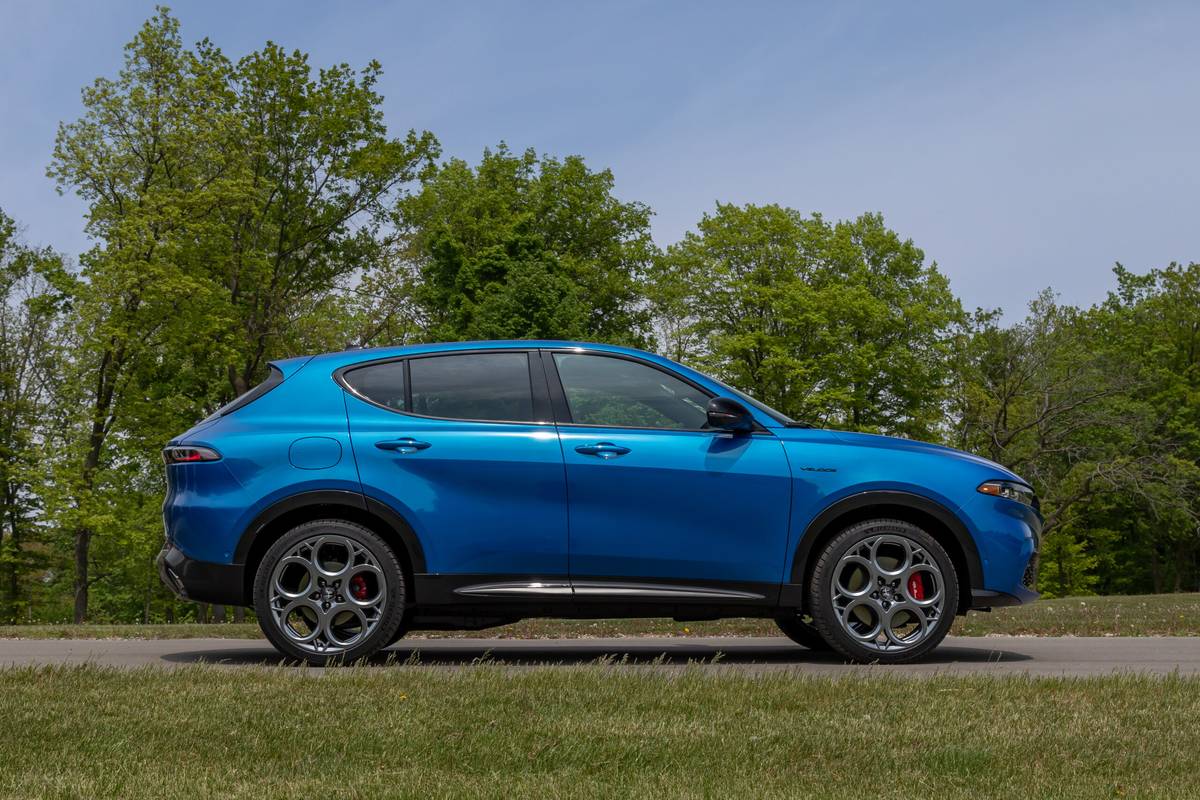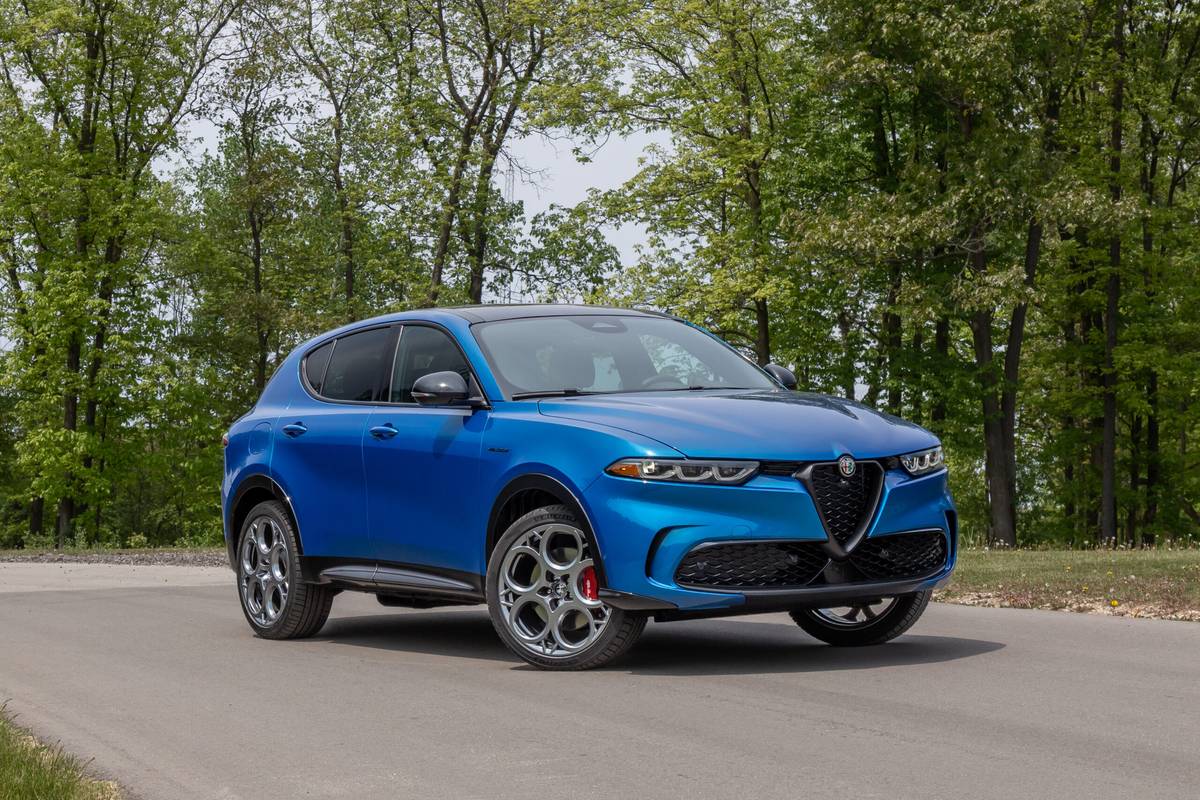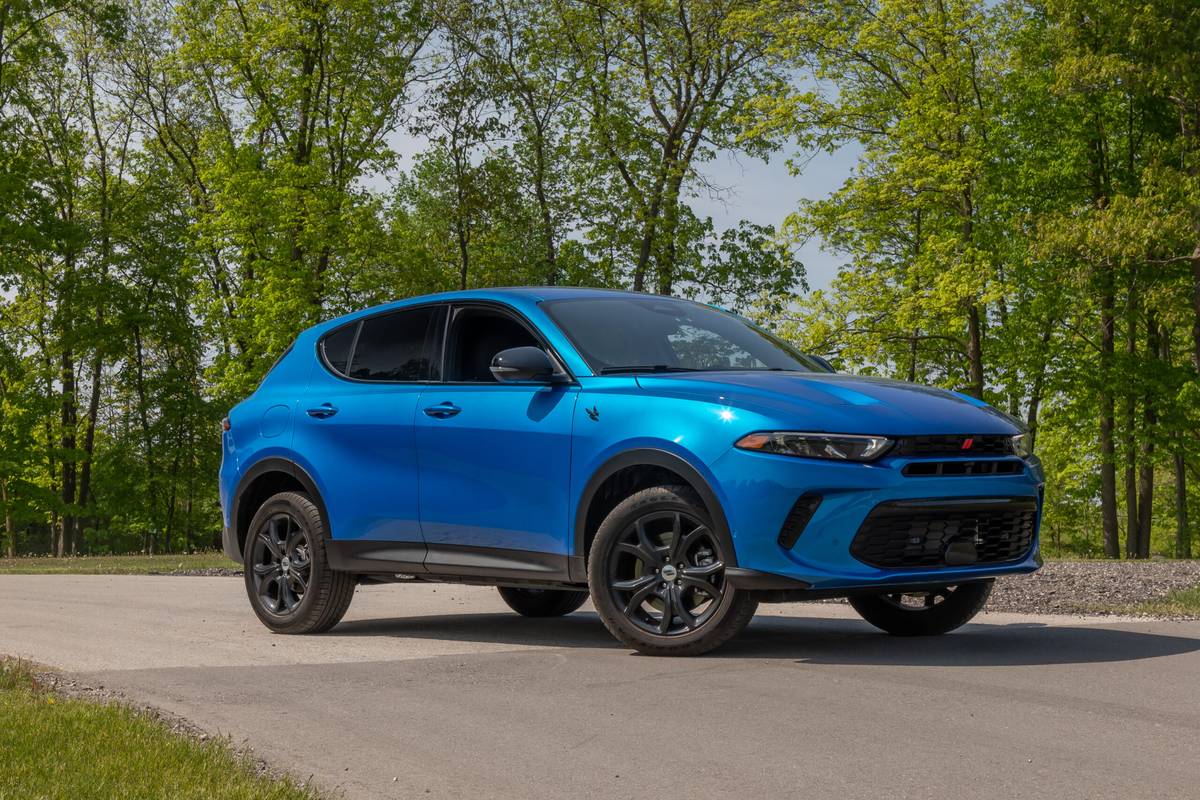2024 Alfa Romeo Tonale Vs. 2024 Dodge Hornet: Which Does It Better?


Over the years, the idea of “badge engineering” has had its stints of popularity with nearly every big global automaker. The heyday of the practice was in the 1970s and 1980s, when American car companies would change a car’s grille, the wheels, some paint, maybe the upholstery, slap on a Chevroldsmobuillac badge, and call the same car three different names and sell it at three different brands’ dealerships. Since then, automakers have gotten sneakier about the practice, but it’s still alive and well — it’s just that these days, the changes between models are a lot more visually extensive, and they often include significant “retuning” of the car’s various bits to make it look and feel different from its kin.
Related: 2024 Alfa Romeo Tonale Review: A Shot of Espresso in a Decaf World
Enter Stellantis, the European-headquartered multinational behemoth that fields more than a dozen automotive brands, including the two you see here: Italian luxury brand Alfa Romeo and American performance brand Dodge. The benefit of being a big automaker is that you can spread out operating, development, engineering and manufacturing costs among multiple global markets, several global brands and hundreds of thousands of vehicles. But sometimes it results in products that share a lot of components, equipment, and sometimes even body panels and styling that then get sold in the same market under different brands.
That’s what we have here with the brand-new 2024 Alfa Romeo Tonale, the Italians’ new compact SUV that’s meant to spearhead its massive push back into the U.S. market with a more affordable, more approachable, more appealing entry-level product to draw in some new customers. But down the street at the Dodge dealer sits the brand-new Dodge Hornet, and if they look similar to you, well, that’s because they share a lot of the same equipment, components and body panels. They even share a powertrain, with the Alfa featuring a standard plug-in hybrid system that incorporates a turbocharged four-cylinder engine (that powertrain is optional for the Dodge).
What they don’t share is pricing. A base 2023 Dodge Hornet GT starts at $32,330 (all prices include destination), but the Hornet that’s more comparable to the Tonale is the plug-in hybrid 2024 Hornet R/T, which will start at $42,530. The Alfa Romeo Tonale is only offered as a PHEV, and the base Sprint trim starts around two grand more than the Dodge at $44,590; it goes up from there with the better-equipped Ti and Veloce trims.
This begs the question: Given we have two very similar vehicles being sold at two different dealerships and with two different missions, is there enough differentiation between the Hornet and Tonale to justify paying more for the Alfa? Has Stellantis done enough in tuning the two vehicles to look and feel different? Can you get a budget Alfa Romeo at your local Dodge dealer, or is Alfa trying to sell us a fancied-up Dodge at a premium price? I recently had a rare opportunity to drive both the 2024 Dodge Hornet R/T (and the gas-only ‘23 GT) back to back with the 2024 Alfa Romeo Tonale Veloce at the Midwest Automotive Media Association’s 2023 Spring Rally in Elkhart Lake, Wisc., to find out.










Illy Espresso Vs. Starbucks Frappuccino?
My first exposure to the Tonale was during a vacation in Italy a few weeks prior to the rally, in which I drove a brand new ‘24 in European spec through the mountains surrounding Lake Como for several days (read about it here), and I came away mightily impressed with what Alfa Romeo has engineered. The Tonale is quick, stylish, well built and decidedly sporty — and the American-spec one I drove in Wisconsin is even better thanks to heavier steering feel and a slightly different feel to its suspension. The interior is still a highly attractive cabin chock full of top-notch materials, stylish accented color stitching and actual buttons instead of touch-panel-everything. It feels worth the money Alfa Romeo is asking for it, something backed up by the car’s exterior styling, which features Alfa’s gorgeous signature three-bulb headlight treatment flanking the traditional triangle grille. I still maintain the Tonale feels like an exciting premium entry in a category full of boring milquetoast crossovers, none of which are intended to excite buyers or make a style statement like the Alfa does.
Then you have the Hornet, which starts at a base price well under the Alfa’s and features a different base powertrain, slightly different exterior styling, a different dashboard, different seats and interior upholstery, and a different tune to its mechanical components, too. Even when comparing the plug-in hybrid R/T, which features the same turbocharged 1.3-liter four-cylinder engine, 15.5-kilowatt-hour battery pack, electric drive motor on the rear axle and six-speed automatic transmission as the Alfa Romeo, the price isn’t that much less than its counterpart. Strangely, the only on-paper difference between the two PHEV powertrains seems to be output: The Dodge is rated at 288 horsepower and 383 pounds-feet of torque, the Alfa Romeo at 285 hp and 347 pounds-feet of torque.
















Decidedly Distinctive Flavors
Here’s the kicker: The Hornet feels quite different from the Tonale, from the cabin experience to the driving experience. The styling team might have been limited in how much they could differentiate the two (unique body panels are very expensive to stamp), but the underbody bits you only “experience” instead of see have been given a different focus.
The Hornet R/T (and even the gas-only GT) feels quick, athletic and decidedly sportier than anything else in its category, which is exactly what Dodge intended. But compared with the Hornet, the Alfa feels sharper, a bit more responsive and more refined. It has a more premium feel to its driving experience, from the feedback through the leather-wrapped, chunky steering wheel to the beautifully damped ride quality on broken pavement. It even sounds different from the Hornet, with a distinctly Italian, raspy exhaust note that’s totally in keeping with the brand’s aesthetic.












Sufficient care has been taken inside the two vehicles to make sure they have a different feel to them, too. The displays alone are helpful in this regard — the Hornet’s digital gauge cluster features Dodge-like graphics and options, while the Tonale’s classier graphics are more in keeping with the Italian style that Alfa brings to the party. The Alfa’s round climate control vents look lifted right out of the Giulia sedan or Stelvio SUV, while the Dodge’s more rectangular look to the dash and vents is more in keeping with its big brother, the Dodge Durango.
More From Cars.com:














Which Should You Buy?
I’m under no impression that anyone frequenting an Alfa Romeo showroom has likely ever set foot in a Dodge store, nor are they about to anytime soon. A Hornet buyer and a Tonale buyer are two very different people — Alfa Romeo has made no secret that it’s looking to attract a predominantly female clientele to the showroom with the Tonale and tuned it to be a bit less boisterous and testosterone-fueled than the rest of the lineup, like the sports sedan Giulia or aggressively muscular Stelvio SUV. Dodge, on the other hand, has leaned into that testosterone-fueled, chest-thumping, raucous image with year after year of overpowered muscle cars to surprising success. It’s now overlaying that image onto the Hornet, even dipping into Dodge history by showing a “GLH” dealer-installed performance and styling package to evoke the old Dodge/Shelby Omni GLH sport hatchbacks from the 1980s. The Hornet’s image couldn’t be more different than the Tonale’s, and both brands’ efforts at targeting their respective buyers will be aided by the fact that these SUVs actually do look, feel and work differently.
So, is the Hornet a budget Alfa? Is the Alfa a fancier Dodge? Neither, really. They may share some styling panels and underhood bits, but they’re both going after different people and have been successfully tuned to those buyers’ specific tastes (and wallets). If you opt for a Hornet R/T over a Tonale, you’re not getting a cheaper Alfa — you’re getting a different-feeling, different-looking, different-performing, less fancy vehicle at a less fancy price. Opt for the Alfa instead, and your extra cash is exchanged for extra refinement, nicer materials, a decidedly Italian flavor to the interior and displays, and an exhaust note that ties the Tonale in nicely with other models in the Alfa showroom. Both are entertaining to drive and standouts in their respective categories, but it really comes down to whether you want an Italian espresso or an American frap.
Related Video:
Cars.com’s Editorial department is your source for automotive news and reviews. In line with Cars.com’s long-standing ethics policy, editors and reviewers don’t accept gifts or free trips from automakers. The Editorial department is independent of Cars.com’s advertising, sales and sponsored content departments.

Detroit Bureau Chief Aaron Bragman has had over 25 years of experience in the auto industry as a journalist, analyst, purchasing agent and program manager. Bragman grew up around his father’s classic Triumph sports cars (which were all sold and gone when he turned 16, much to his frustration) and comes from a Detroit family where cars put food on tables as much as smiles on faces. Today, he’s a member of the Automotive Press Association and the Midwest Automotive Media Association. His pronouns are he/him, but his adjectives are fat/sassy.
Featured stories









